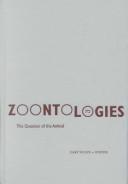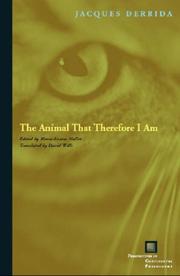| Listing 1 - 10 of 185 | << page >> |
Sort by
|

ISBN: 0816641056 0816641064 9780816641062 9780816641055 Year: 2003 Publisher: Minneapolis (Minn.) : University of Minnesota press,
Abstract | Keywords | Export | Availability | Bookmark
 Loading...
Loading...Choose an application
- Reference Manager
- EndNote
- RefWorks (Direct export to RefWorks)
Book
ISBN: 0816634866 9780816634866 Year: 2000 Publisher: Minneapolis: University of Minnesota press,
Abstract | Keywords | Export | Availability | Bookmark
 Loading...
Loading...Choose an application
- Reference Manager
- EndNote
- RefWorks (Direct export to RefWorks)
Book
ISBN: 9791035807887 Year: 2012 Publisher: Paris cedex 14 (Humensis 170 bis, boulevard du Montparnasse 75680) : Presses Universitaires de France,
Abstract | Keywords | Export | Availability | Bookmark
 Loading...
Loading...Choose an application
- Reference Manager
- EndNote
- RefWorks (Direct export to RefWorks)
L'animal impose hors de nous et en nous une présence antérieure au rapport réflexif par lequel nous nous saisissons et approprions nous-même. Loin d'être un à-côté accidentel et avant toute figuration philosophique, il incarne cette énergie du donné dans un monde si humainement construit. Il n'est pas vrai que le sujet s'édifie et se vit dans un monde binaire d'objets ou de semblables. Toujours déjà peuplé, diffracté par autant de possibilités réalisées de perception, le monde fut et demeure d'abord animal. Signifiant l'immédiateté à soi et au réel, impliquant et notre identité intime et notre altérité irréductible, troublant départages, oppositions et, de proche en proche, netteté de tous nos concepts, l'animal est cette question inclassable dont l'ubiquité engage à nouveaux frais la philosophie et l'interroge tout entière, tel ce négligé de son histoire l'habitant sourdement mais constamment. Penser l'animal nous contraint à penser autrement et à reconsidérer nos catégories, problèmes et valeurs : la connaissance, l'existence, l'éthique.
Book
ISBN: 2021174778 Year: 2017 Publisher: Paris : Éditions Seghers,
Abstract | Keywords | Export | Availability | Bookmark
 Loading...
Loading...Choose an application
- Reference Manager
- EndNote
- RefWorks (Direct export to RefWorks)
"Quelque chose a changé dans notre rapport aux animaux. La "cause animale" est à l'ordre du jour, et le vivant humain est désormais plus essentiellement animal qu'humain. Cela s'appelle un zoocentrisme : au centre de notre humanité, l'animalité. En apparence, nous avons tout à gagner à cette nouvelle image de l'homme. Elle nous vient de la biologie de l'évolution, qui nous a situés, quelque part dans l'ordre des primates, en bonne compagnie avec nos cousins les grands singes. Elle est aussi un appel à réformer et à moraliser nos relations avec les animaux que nous exploitons : on respecte d'autant mieux qui nous ressemble. Enfin l'animalité humaine fait de nous des esprits forts, qui ont su en finir avec les dualismes et les grands partages métaphysiques d'antan. Bref : c'est à tous égards une pensée progressiste, car ouverte à la science, généreuse envers les animaux, et philosophiquement éclairée. Il se pourrait pourtant que ces raisons d'en finir avec la différence homme-animal ne soient qu'un ensemble de pensées bancales qui, entre oubli des sciences humaines, réduction de la vie humaine à sa seule vulnérabilité et déni de ce que nous vivons en première personne, composent finalement le portrait idéologique d'un progressisme stérile. Pouvons-nous échapper au "complexe des trois singes", ces trois façons de méconnaître ce que nous vivons et faisons comme vivants humains ? Et pouvons-nous imaginer un progressisme de vérité conscient de tout ce que nous devons aux animaux sans pour autant renier ce que nous sommes ?" -- Back cover.

ISBN: 9780823227914 9780823227907 Year: 2008 Publisher: New York Fordham university press
Abstract | Keywords | Export | Availability | Bookmark
 Loading...
Loading...Choose an application
- Reference Manager
- EndNote
- RefWorks (Direct export to RefWorks)
Animals (Philosophy) --- Animals (Philosophy). --- Philosophy
Book
ISBN: 0253016207 9780253016201 9780253016133 9780253016171 0253016134 0253016177 Year: 2015 Publisher: Bloomington, [Indiana] ; Indianapolis, [Indiana] : Indiana University Press,
Abstract | Keywords | Export | Availability | Bookmark
 Loading...
Loading...Choose an application
- Reference Manager
- EndNote
- RefWorks (Direct export to RefWorks)
Animals (Philosophy) --- Philosophy --- Plato.
Book
Year: 1999 Publisher: Paris: PUF,
Abstract | Keywords | Export | Availability | Bookmark
 Loading...
Loading...Choose an application
- Reference Manager
- EndNote
- RefWorks (Direct export to RefWorks)
Book
ISBN: 9780367437206 0367437201 Year: 2020 Publisher: Abingdon: Routledge,
Abstract | Keywords | Export | Availability | Bookmark
 Loading...
Loading...Choose an application
- Reference Manager
- EndNote
- RefWorks (Direct export to RefWorks)
"This book re-examines the concept of the animal on a new plane of immanence, as opposed to the traditional viewpoint founded on the plane of transcendence. Following Deleuze and Guattari's notion that philosophy is a discipline of creating concepts, this book traces how the concept of the animal was created in the history of philosophy through re-reading the works of Descartes, Kant, Heidegger, Derrida and Levinas. Their theories show that the concept of the animal was constructed on the "plane of transcendence" as subservient to the self-serving human, who represents the animal as a negative entity devoid of reason, ethics, the ability to enter into political alliances or even die. With this perspective and a range of theories from thinkers such as Spinoza, Nancy, Haraway and Braidotti as the groundwork, a new positive concept of the animal, operating on the plane of immanence, is sketched out which compels reappraisal of the relationships between body and thought, ethics and politics, or life and death. With comprehensive interpretations of the views of several key philosophers from Kant and Heidegger to Deleuze, Derrida and Agamben, this book will be valuable for scholars of theoretical animal studies and continental philosophy interested in the philosophical significance of the animal question"
Book
Year: 2018 Publisher: Göttingen : Konstanz University Press,
Abstract | Keywords | Export | Availability | Bookmark
 Loading...
Loading...Choose an application
- Reference Manager
- EndNote
- RefWorks (Direct export to RefWorks)
Kant's reflections on animals open up a hitherto overlooked approach to his conception of human intuition and imagination. In her book, Rahel Villinger shows how Kant's aesthetics, epistemology, and theory of history become completely readable against the background of the assumption of animal cognition through intuition and imagination. Kant as a frigid thinker of human reason, who sees in the forces of sensuality nothing but immorality and animal lethargy: this prejudice is still widespread. In fact, sensuality for Kant is an intrinsic and independent faculty of knowledge through intuition and imagination. Kant radically upgraded sensuality, which was independent of reason, from the rationalistic school philosophy of his day and also against the newly emerging philosophy of German idealism. We need the imagination of other animals to be able to think our own and to critically push the boundaries. Therefore, an imagination of animals with Kant includes both: the notion of a superhuman power of purely sensual intuition and imagination whose singularity and immediacy reflect the perfection and infinity of divine intuition; and the specific imagination of rational animals, whose descriptive activity combines image and writing, vividness and concept, and which becomes possible only through the imagination of their premature origin - their animal prototype. The guide to his reflections on animals thus reveals a hidden ambiguity in Kant's thinking of sensual nature, which determines the foundations of modern aesthetics, poetics, and pictorial theory.
Book
ISBN: 8024640600 9788024640600 9788024640563 Year: 2019 Publisher: [Prague]
Abstract | Keywords | Export | Availability | Bookmark
 Loading...
Loading...Choose an application
- Reference Manager
- EndNote
- RefWorks (Direct export to RefWorks)
| Listing 1 - 10 of 185 | << page >> |
Sort by
|

 Search
Search Feedback
Feedback About UniCat
About UniCat  Help
Help News
News